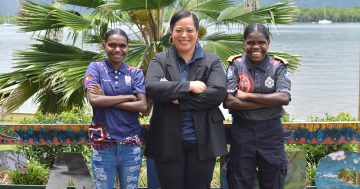Adrian Granzella Larssen* talks to successful women who have discovered the importance of taking risks.

Image: Patpitchaya
Making mistakes is inevitable.
From the little hiccups — like hitting “reply” instead of “forward” — to years-long regrets like spending too much time in a just-okay job, those missteps can seem like the end of the world.
They rarely are, though.
Successful women I spoke to were able to look back and see that the journey wasn’t perfect every step of the way, but they’ve realised those “mistakes” taught them lessons that they’ve carried throughout their careers.
At the start of her career, Reshma Saujani had all the outside markers of traditional success.
“I spent my entire life trying to credentialise myself … to get the ‘perfect’ big law job,” she says.
The problem? On the inside, she felt miserable.
“The desire to be perfect held me back,” she says.
“Playing it safe meant that my passion — organising and fighting for women and girls — was my side hustle for way too long.”
When she realised how unhappy she was, she quit her job and decided to run for office.
She lost the race, but it was the first time she had felt real joy in her professional life.
“I took a risk; I failed miserably, but I felt more alive than I’d ever been because I was no longer filled with regret,” she says.
Ultimately, that experience spurred her to take even more risks, like founding the international nonprofit Girls Who Code, which has to date taught technical skills to more than 185,000 girls.
Her advice?
“I would encourage other women to be brave, not perfect,” she says.
“Once we realise our mistakes won’t kill us, and that perfection is getting us nowhere, there’s nothing that can stop us.”
Early in her career, Julia Collins, cofounder of Zume Pizza and CEO of Planet Forward, felt a tremendous amount of pressure to conform to the leadership style of those around her — specifically, her older, male bosses.
“I remember trying to change my outward appearance and even my tone of voice to come off as more masculine and, I thought, more authoritative,” she says.
That was a mistake.
“Not only did I feel totally awkward in this mask, I was less effective as a leader and had a more difficult time relating to peers.”
She’s since learned to do exactly the opposite: to show up at work as herself and she encourages other women to do the same.
“I believe that the world is calling for a new kind of leadership,” she says.
“It’s time to abandon a lot of the old tropes about what bosses look like and sound like.”
Julie Zhuo has had a meteoric rise at Facebook — she started as a product designer, now serves as VP of Product Design.
Early on, though, she struggled with impostor syndrome.
Coming to the job with a computer science degree, she compared herself with her peers, many of whom had more traditional design school backgrounds.
“I felt like I had to show up every day pretending I was a real designer,” she says.
She would work furiously to make her work perfect and wouldn’t ask other designers for help for fear that they’d think they made a mistake in hiring her.
Looking back, she admits that this was a much slower way to learn.
“If I had been more proactive in getting feedback from the designers I admired, I would have gotten those perspectives much earlier and had more one-on-one attention,” she says.
Now, she asks for help whenever she can.
“I realised how powerful it was to not pretend that everything was fine but instead seek help and support when I needed it.”
Ambika Singh started her career at Microsoft in marketing, and like many young professionals, did everything she could to succeed at work.
But the founder and CEO of clothing rental company Armoire says the most important lessons she should have been learning were found outside of her job.
“At Microsoft, there was a lot of training and focus on how to operate there,” she says.
“What was actually more important was meeting and building relationships with people who would follow me throughout my entire career.”
She ended up finding those people outside of work.
In fact, one of the most important supporters of Armoire has been a former Microsoft colleague she spent time with doing charity work and hiking.
Ann Shoket is well-known as the former editor-in-chief of Seventeen.
But she was actually up for a top magazine job twice before she landed it.
“The first time,” she recalls, “I prepared for weeks with spreadsheets and research strewn all over my tiny apartment … and I showed up to present the idea to my boss, Hearst magazines President, Cathie Black, with notecards that were literally shaking in my hands.”
The project didn’t get approved, and looking back, she knows she wasn’t ready.
The second time, she was ready, but an editor with a decade more experience got the job.
She doesn’t see either of these experiences as failures — not even close.
“I think that every time you go for something big and don’t succeed that you are getting stronger, smarter, tougher for the next fight,” she says.
In fact, she tells other women that they should put themselves in situations where they’re not going to win.
“If you succeed every time, you’re not pushing yourself hard enough, and you’re not growing.”
Now, in her new life as author and founder of The Badass Babes Community, she looks at hurdles this way.
“Every time something doesn’t work out, I know that it’s preparing me for the right opportunity to come.”
* Adrian Granzella Larssen is the founder of Sweet Spot Content and the former editor-in-chief of TheMuse.com.
This article first appeared at www.fastcompany.com.











